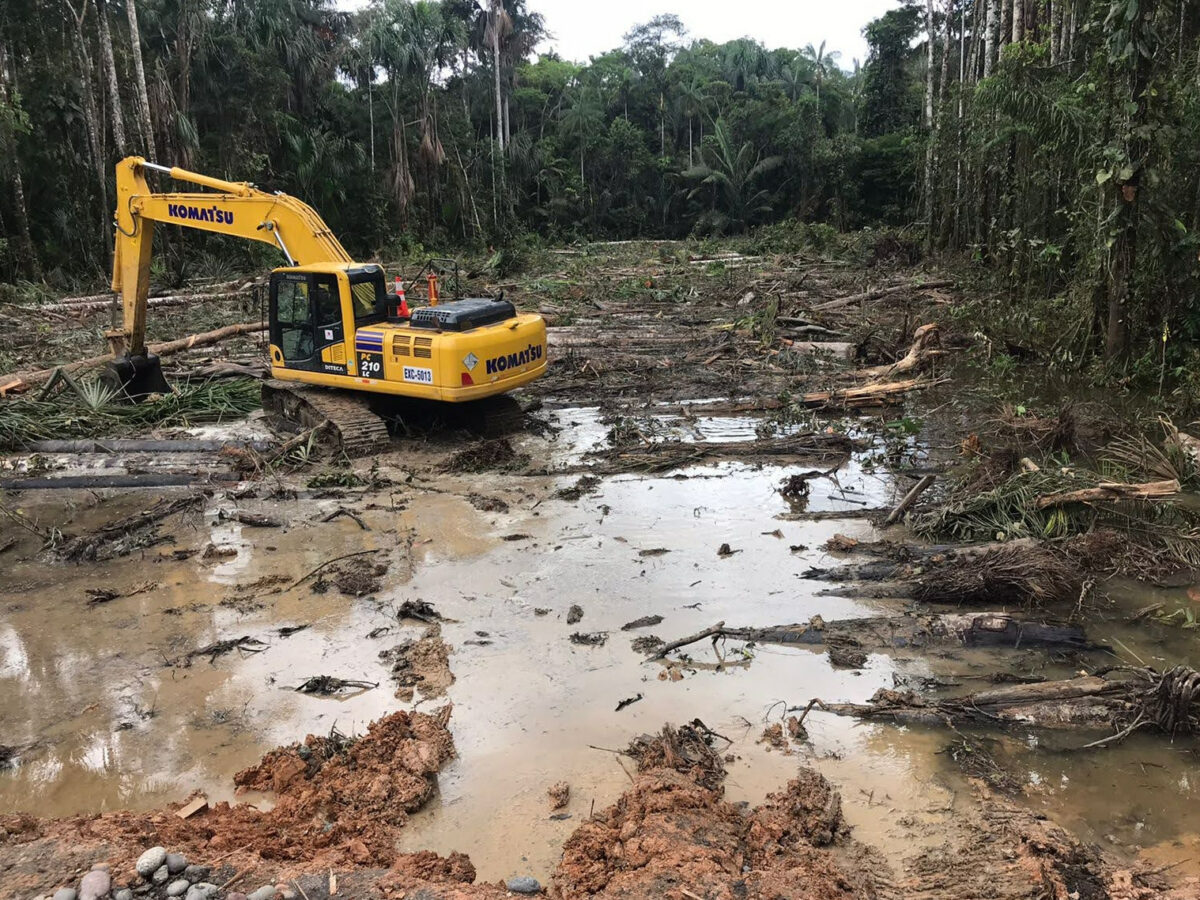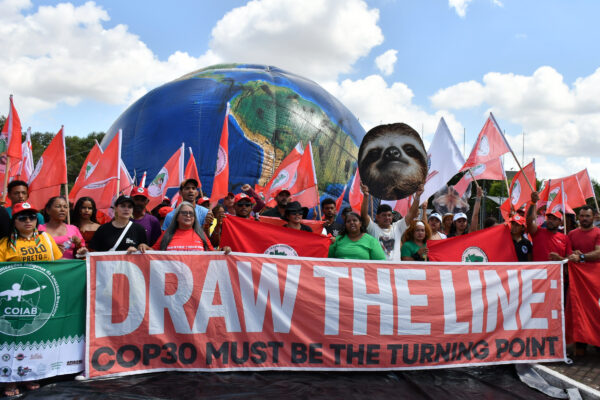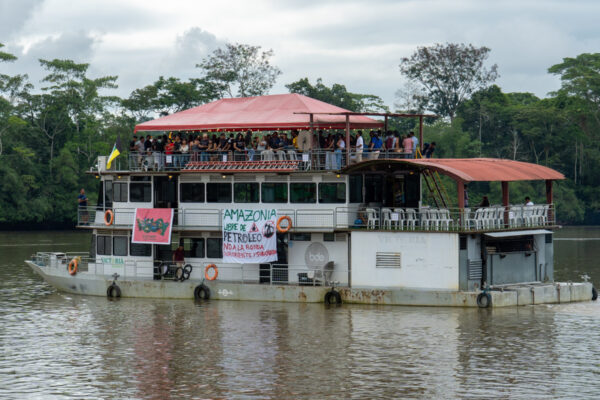In August 2023, millions of Ecuadorians made history. The country became the first to keep fossil fuels in the ground by popular vote, with an overwhelming 60% choosing to keep over 700 million barrels of crude permanently in the ground underneath Yasuní National Park. It was a major victory for Indigenous peoples, biodiversity, and the climate in a country that is the largest producer of Amazon crude and which has seen decades of contamination and rights abuses at the hands of the oil industry.
But now, the government seeks to upend the will of voters and continue drilling in Yasuní under the pretense of funding the country’s escalating conflict with organized crime.
President Daniel Noboa announced his support this week for a “moratorium” on implementing the referendum results for “at least a year,” backing away from a campaign promise and declarations he made after taking office in October that the referendum results would be respected and implemented. At the time, he expressed intent to move Ecuador away from commodities and that the country didn’t have to keep drilling like “back in the stone age.” He also questioned the economic logic of continuing to drill in Yasuní. Ecuador crude sells for $8 less than the WTI benchmark, which is projected to be not greater than $70 for the next five years. Crude from Yasuní is even more deeply discounted, and sells for $58. But it costs an estimated $59 per barrel to extract. “If I were to make any money, it would be very little,” said Noboa at the time.
The country’s Constitutional Court, which green-lighted the referendum, gave state-run oil company Petroecuador one year from the vote to end drilling of the Ishpingo, Tambococha, Tiputini (ITT) oil fields inside Block 43 in the country’s remote rainforest region along the Peruvian border. Additionally, it ordered that all infrastructure must be dismantled and removed, and the area remediated and restored, within that one-year timeframe. Yasuní is a UNESCO biosphere reserve widely considered one of the most biodiverse places on the planet, and it is home to Indigenous peoples, including the Tagaeri, Taromenane, and Dugakaeri who are living in voluntary isolation from the outside world.
Noboa claims his about-face is needed to help finance the country’s efforts to stop a surge in violence from drug cartels that is terrorizing the nation and restore order and security. Once relatively tranquil, Ecuador has very recently become one of Latin America’s most dangerous places, with the highest homicide rate in the region. A state of emergency was declared on January 8, followed by a declaration of “internal armed conflict” the day after.
But Ecuador’s Indigenous movement and the Yasunidos collective who spearheaded the original campaign to gather signatures to qualify the question of leaving the ITT reserves in the ground to voters challenge Noboa’s pretext for delay.
“Noboa and oil interests are taking advantage of the crisis,” said Pedro Bermeo from Yasunidos. “Instead of considering other options – like ending tax breaks and subsidies for big corporations – they are trafficking in fear to undermine the will of voters and upend democracy. This is not Daniel Noboa’s decision. The people have voted, and our votes must be respected.”
Indeed, the current crisis is providing an opportunity for the government to push through a long wish list of Shock Doctrine style regressive neoliberal reforms, like raising the value-added tax and ending fuel subsidies that previous administrations were unable to do, taking advantage of daily curfews and the fact that many civil liberties, like the right to assemble, are suspended. Noboa is also moving to expand powers and grant broad immunity to the military and police, raising major concerns from rights advocates and environmental defenders. “Democracy can’t become the new victim of organized crime,” stated Vivian Idrovo, coordinator of the Alliance of Organizations for Human Rights in Ecuador.
Of additional concern is the fact that Noboa has expressed his desire to use funds from drilling in Yasuní to support further military action, while also asking the U.S. government for increased security aid. In fact, the Biden administration should make it crystal clear that Ecuador should not sacrifice human rights, the environment, or the democratic process to protect Yasuní for the sake of security. A condition for U.S. aid is respect for human rights, and Noboa’s plans to undermine or delay implementation of the decision of the Inter-American Court with respect to Yasuní should be of extreme concern to U.S. officials.
Undermining democracy
The strength of keeping ITT oil in the ground via referendum vote was that it could not be easily undone. It was not a presidential decree or a policy that could be reversed by a new government, industry pressure, or shifting political winds. However, Noboa and a group of legislators are exploring ways to circumvent the clear decision of Ecuadorians at the polls.
Noboa may try to petition the Constitutional Court for more time to implement the decision – something Petroecuador has been arguing in hopes of prolonging well closure as long as possible. But the Yasuní referendum question was placed on the ballot as remedy for a court case brought by Yasunidos, who, according to the Constitutional Court, had their right to participatory democracy violated when the 750,000 signatures they collected to qualify for a referendum were wrongly deemed invalid.
As Amazon Watch legal advisor Nathaly Yepez explains, “Even in a scenario in which the Court determines that the request to extend the deadline somehow complies with the results of the Yasuní referendum, it still could not render it meaningless and nullify what was decided at the polls. The referendum imposes immediate obligations that the government already must comply with, such as not entering into new contracts that continue oil exploitation in Block 43 in Yasuní.”
Another extreme idea being explored by several members of congress is to simply repeat the referendum, a blatant attack on democracy given it was less than six months ago that the vast majority of voters approved keeping oil in the ground, and no progress has been made to implement the results of the first referendum.
Even without any new pretext, Petrocuador has been dragging its feet on implementing the vote within the one-year timeframe established by the court, citing costs and technical challenges to closing the 225 wells that produce an estimated 58,000 bpd. The company has conveniently interpreted the one-year deadline to mean it has until August 2024 to stop production, as opposed to completing the removal of all equipment and remediation and clean-up of the damage that its activities have already caused. Yasunidos recently filed a complaint with the court over Petroecuador’s failure to begin implementing any of the court ordered measures.
Increased threat for isolated peoples
Not only does delay in implementing the referendum vote undermine democracy, it is an existential threat for the nomadic Tagaeri, Taromenane, and Dugakaeri, Ecuador’s last known Indigenous peoples living in isolation. Much of their traditional territory includes the boundaries of Yasuní National Park. But eight oil concessions overlap the park, and a controversial new road to connect wells of the ITT fields is less than a quarter of a mile from a designated no-go zone established in 1999 to protect them.
The Tagaeri, Taromenane, and Dugakaeri are under pressure from all sides – hemmed in by oil wells, pipelines, and roads – while illegal loggers and poachers further encroach into forest area they traditionally use, interrupting their seasonal hunting, fishing, and food collection patterns. Contamination from frequent oil spills along with gas flaring also pose significant health risks, and continued drilling increases the likelihood of forced contact, violent conflict, exposure to disease, and continued erosion of their food sovereignty and autonomy.
Many of these rights violations are part of a groundbreaking case on the rights of isolated Indigenous peoples now pending before the Inter-American Court of Human Rights. The Tagaeri and Taromenane Indigenous people vs. the Ecuadorian state was brought on behalf of the three Indigenous peoples against the Ecuadorian government for failing to protect them and putting them at risk from oil extraction. A decision is expected this year.
According to Leonidas Iza, president of CONAIE (the Confederation of Indigenous Nationalities of Ecuador), the current crisis is being used as a pretense to implement regressive measures that particularly affect Indigenous peoples. “Under the pretext of the current crisis, the government wants to implement its neoliberal economic model, exonerating taxes for big companies while raising them on everyone else. In the Amazon, oil drilling is also death and destruction. For 50 years we’ve been told that oil extraction will bring development and reduce poverty. But the opposite is true. We know firsthand that more oil will not solve the security or financial crisis we are suffering through together as a country. The mafias of the extractive industry are part of the problem. Our Indigenous brothers living in isolation, Yasuní, and our democracy must not be sacrificed for a crisis that can be solved a different way.”
In the midst of rising violence last August, an overwhelming majority of Ecuadorians voted for hope. They voted to protect nature and Indigenous rights. They voted for future generations. They voted for life. We stand in solidarity with Ecuador in the face of this crisis and all those that face violence. And the eyes of the world are on President Noboa and his administration to respect the will of its voters and to keep the oil in the ground.













